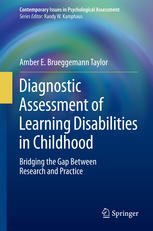

Most ebook files are in PDF format, so you can easily read them using various software such as Foxit Reader or directly on the Google Chrome browser.
Some ebook files are released by publishers in other formats such as .awz, .mobi, .epub, .fb2, etc. You may need to install specific software to read these formats on mobile/PC, such as Calibre.
Please read the tutorial at this link: https://ebookbell.com/faq
We offer FREE conversion to the popular formats you request; however, this may take some time. Therefore, right after payment, please email us, and we will try to provide the service as quickly as possible.
For some exceptional file formats or broken links (if any), please refrain from opening any disputes. Instead, email us first, and we will try to assist within a maximum of 6 hours.
EbookBell Team

4.4
52 reviewsDiagnosing learning disabilities (LD) in children has never been an easy task. The multiple approaches in use complicate the assessment process, raising the risk of young students getting the wrong services, or none at all. It is clear that more accurate diagnosis and classification methods are needed to advance the prevention and treatment of difficulties in reading and mathematics.
Diagnostic Assessment of Learning Disabilities in Childhood takes important steps to cut through the confusion. This timely resource weighs the strengths and weaknesses of commonly used assessment methods including the aptitude-achievement discrepancy, cognitive processing, RTI and low achievement approaches and introduces the author's academic impairment model as a promising alternative. A chapter on comorbid disorders in students with LD guides readers in the fine points of differential diagnosis. And to make the coverage especially practical, the book's features link the theoretical to the real-world practice of LD assessment, among them:
Diagnostic Assessment of Learning Disabilities in Childhood is an invaluable reference for school and clinical child psychologists, special education and allied educational professionals and researchers and graduate students in school, educational and clinical child psychology who are dedicated to higher measurement standards and greater opportunities for children’s academic success.